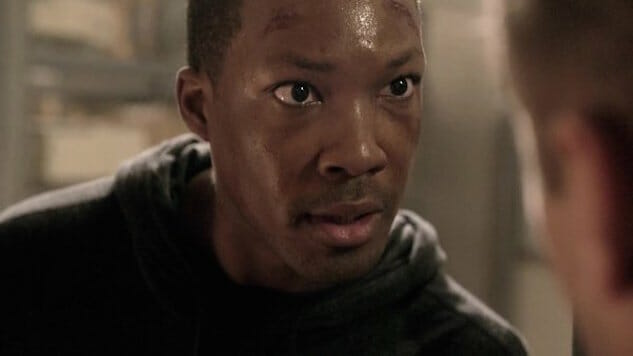24: Legacy: Same Show, New Era (and That’s Not a Compliment)
Fox
As Rebecca Ingram (Miranda Otto) prepares to depart, winding up her tenure as national director of the Counter Terrorist Unit by holding transition meetings with her successor (Teddy Sears), the latest iteration of 24 strikes—inadvertently, it seems—at the heart of the matter. As with her traitorous Allison Carr, from the fifth season of Showtime’s Homeland, Otto’s Rebecca is a crisp, capable figure, delivering directives with flat authority; unlike Carr, she is, at least through the first three episodes of 24: Legacy, a “patriot,” prioritizing the country’s safety over both protocol and her personal life. The trouble is, even patriots aren’t immune to power’s distorting influence, its enrapturing embrace: As Rebecca reflects in the series premiere, already uneasy at the prospect of focusing on her husband’s presidential ambitions, “Running CTU is like a drug. Hard to come down from.”
The same might be said of the president’s powers, which, once accrued, are not readily relinquished, and it’s this that marks 24: Legacy as a symptom of withdrawal—a series that hangs for dear life onto the terms of the original, even as the course of history attempts to rip it away. With few exceptions, Legacy, from creators Robert Cochran and Joel Surnow, replicates both the style and the spirit of 24, its split screens and ticking clocks almost nostalgic for a moment in which the ends might be seen—on television as in government—to justify the means. Of course, this was no more true in November 2001, when 24 debuted, than it is now, but it’s Legacy’s failure to reckon with the intervening years that reduces it to such a bafflingly tone-deaf reprise. If Homeland, guilty of its own immoderation on the subject, now appears chastened by the War on Terror, 24: Legacy, rather frighteningly, still revels in it. It’s the same series for a new era, strung out on the thrill of the fight.
This isn’t to suggest that 24 never manufactured superb television—I remain staunch in the belief that Jean Smart’s performance as unstable First Lady Martha Logan, in the series’ fifth season, is one of last decade’s finest, opening with camp and ripening into courage—or to deny that I, too, once found it wildly entertaining. (Twelve years ago, before I had my wisdom teeth removed, I rented a season’s worth of DVDs at Blockbuster and devoured them in a single, painkiller-fueled weekend. It was glorious.) But just as the new administration’s malice, reminiscent of Nixon, offers daily reminders of the importance of checks and balances, Legacy, in the present context, underlines 24’s fundamental flaw—one that critics more prescient than I recognized from the outset. The problem with 24, and indeed with the better part of the American public, was that it assumed the expanded power of the intelligence agencies would always remain in the hands of men and women for whom—whatever disagreements we might have over particular policies—the motivating interest was the national one. Now we’ve invited the fox into the henhouse, where our chickens are already cooked.